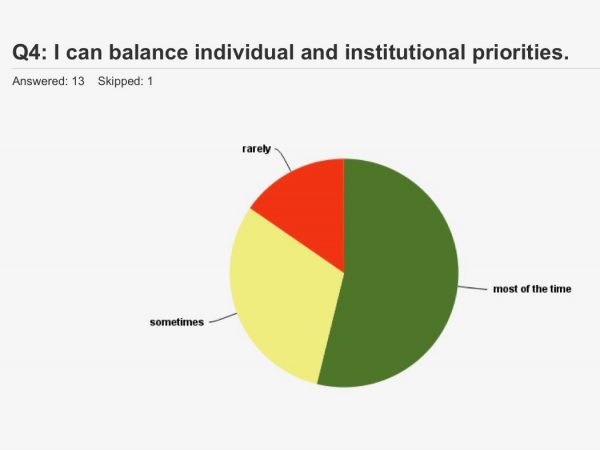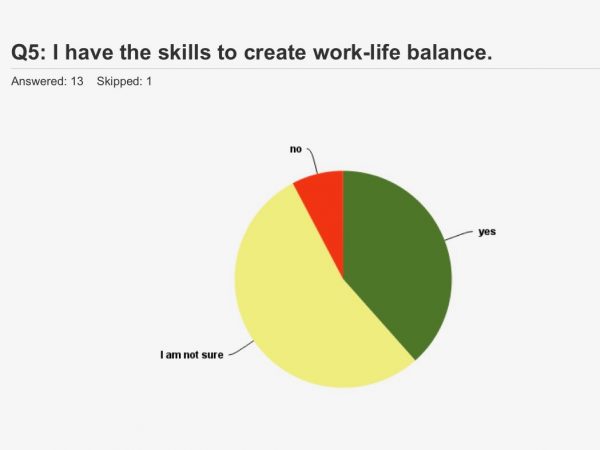Work-life balance in academia

The PlanetS Academic Platform carried out a survey with PlanetS professors and senior scientists to find out their point of view when it comes to ‘work-life balance in academia’ and what it means to them.

For a majority work-life balance means focussing energy and time in a way that reflects values and priorities. (Image: iStock/CHAIWATPHOTOS)
By Nadine Afram
The survey questions were based on work-life balance and time management articles and on feedback from a sample of professors who kindly tested the survey. The survey was built on the online survey tool www.surveymonkey.com and sent to 34 PlanetS professors and senior scientists of which 14 responded within the given two-week period.
A definition for work-life balance was not given intentionally to find out what this ‘balance between an individual’s work and personal life’ in academia means to our most experienced scientists. The first question treated a statement I read online on a forum supposed to motivate PhD students and I asked PlanetS professors and senior scientists if they thought it was true/false or if ‘it depends’. It said ‘There is a very famous myth called work-life balance in Academia. Let’s get this straight right now: there is no work-life balance in Academia. It’s just not possible’. Unsurprisingly, most participants ticked ‘it depends’ and were asked to comment further while one person thought it was true and 5 thought that it was wrong.
Some selected comments:
- [work-life balance] seems just a buzzword meaning to work less.
- It’s difficult to define what “work” is in Academia. If everything job related is considered work (negative view) than there is no balance. The job itself however contains many nice things for work and life.
- It’s more realistic and pragmatic to think of a work-life continuum.
- [work-life balance] is rather hard to achieve, and it is not common, but theoretically it is possible.
- a young researcher must be able to invest sometimes or often >> 100% of work time for a successful career – researchers with a permanent position have lots of duties and with “only” a 100% work time, the own research suffers. Combining family and career is therefore difficult, especially for women, because often they have “traditionally” a more significant work load within the family and it is not easy to convince the partner that things should be changed.
- It might depend on the period. It is all a question of priority. Important deadlines often take over anything else. Another important point in research, you never stop your brain… I do not see why we absolutely would need to separate the 2 aspects.
For a majority of the respondents (~80 %) work-life balance means ‘to focus my energy and time in a way that reflects my values and priorities’.
A large majority (93%) thinks it is important for work-life balance to know your time thieves, while setting goals and planning ahead are also considered important by most (~84%).
Some other results are shown here:


The respondents were then asked to share what, in their opinion, is important for work-life balance, and to add any further comments. Those were some (extracts) of the answers:
- To know oneself and the needs one has.
- Time management and limiting your ambition. You can’t do everything.
- Be in charge rather than only being pushed by external constraints.
- Often many important meetings are scheduled in the evening, when children at home need attendance from the parents. This should be more considered at home institutions. Being late, e.g., every second evening, besides all external meetings and conferences, is unacceptable.
- For me, you have to love what you do and do what you love. Academia is not a 9-to-5 job. You are delusional if you think it is, given the reality of the international job market.
- Work-life balance needs to be defined. Isn’t this simply a new term for just “working less”, say regular 42h or just 50h a week? Or should it include “happiness” and “satisfaction”? This is all complicated and cannot be addressed with a “set your goals” question. Particularly in science and at university, it’s not that simple. There are tasks that have to be done. Period. The work load and other time sinks have to be split more evenly (e.g., to get students on course, admin jobs, reviews, panels, teaching and lab bug fixing).
Categories: Internal Newsletter

